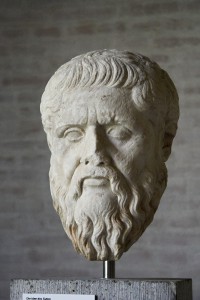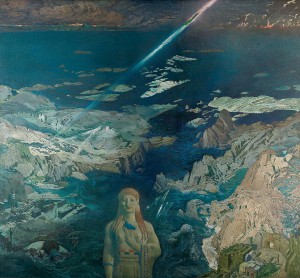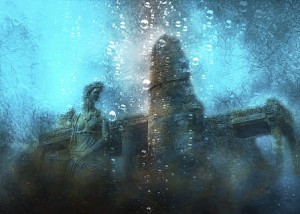Was there a mythical Atlantis?
In 9600 BC, a massive explosion rocks the Atlantic after a series of earthquakes. A glorious continent with an advanced civilisation collapses into the sea. Thus, according to Plato, ends the glorious Atlantis.
 When Plato publishes the dialogues Timaeus and Critias, there are 360 years left until the birth of Jesus. The Roman Empire has yet to reach its greatest glory and Egypt is ruled by Nachthareheb, the last pure Egyptian pharaoh. And it is in Egypt at that time that Plato's friend Solon is to learn of an ancient advanced civilization whose existence was ended by a huge natural disaster.
When Plato publishes the dialogues Timaeus and Critias, there are 360 years left until the birth of Jesus. The Roman Empire has yet to reach its greatest glory and Egypt is ruled by Nachthareheb, the last pure Egyptian pharaoh. And it is in Egypt at that time that Plato's friend Solon is to learn of an ancient advanced civilization whose existence was ended by a huge natural disaster.
Let us now try to look at Atlantis through a slightly different lens, one that takes a different approach to the subject.
First of all, let us say that everything we know about Atlantis is based on Plato's Timaeus and Critias. Plato as a personality is taken to be an idealist who seeks, among other things, personal and social perfection. He is a kind of antithesis of his disciple, Aristotle, whom we would today rather think of as a realist.
Plato portrays Atlantis as a world not so different from the world in which the author himself lived. In Atlantis, a polytheistic Greek deity was not only believed in but existed. In the centre of the city stood the Temple of Poseidon. People visited the baths, had cold and hot water.
It is unlikely that a civilisation in 9600 BC would bear identical characteristics to a culture yet to develop thousands of years later in a completely different place. Why is this the case in the piece?
Plato was an intellectual, a thinker and a philosopher. Plato was obviously not at all concerned with the historical record of the demise of one culture. His aim was to show the most ideal form of government, which the people eventually abandon and, in the style of Greek tragedy, are punished by Zeus.
After all, Plato was not the only one in history who was willing to create worlds for philosophical ideas. In 1516, the English humanist Thomas More published his book Utopia, which is an island (similar to Britain) where everyone lives a blissful life. And from our own lands, Jan Amos Comenius attempts a similar work in The Labyrinth of the World and the Paradise of the Heart.

It would seem that the Atlantis case is a similar fabrication. It would be true if it weren't for Solon. Plato clearly refers to Solon telling him about the mythical Atlantis. And he himself learned about it from the Egyptians. So the hopeful spark still burns that Atlantis did exist, but in a different form than Plato described it.
Solon left behind no version of Atlantis. It's hidden somewhere in the lines of Plato's Timaios and Kritias. Putting these findings together, the closest thing to the real Atlantis is the island of Crete. Here the bull cult was practised, which Plato also mentions in his work. Moreover, Crete traded with other countries and, although it was not located in the Atlantic, it was severely damaged by a volcanic eruption. Although this did not destroy the culture, it did deal a significant blow from which it never properly recovered.
Is it possible, then, that the lost mythical Atlantis could be Crete? Or are the ruins of an ancient civilization really somewhere in the depths of the ocean?


